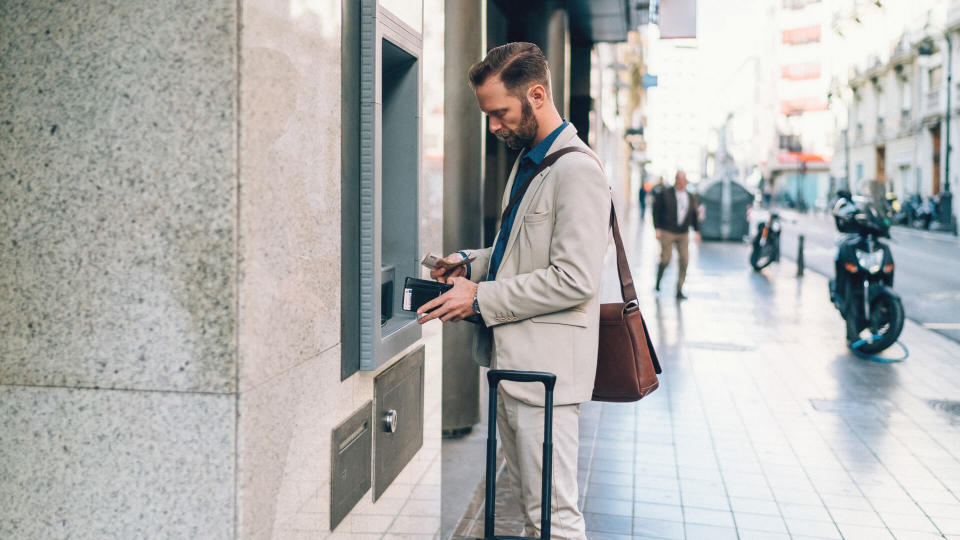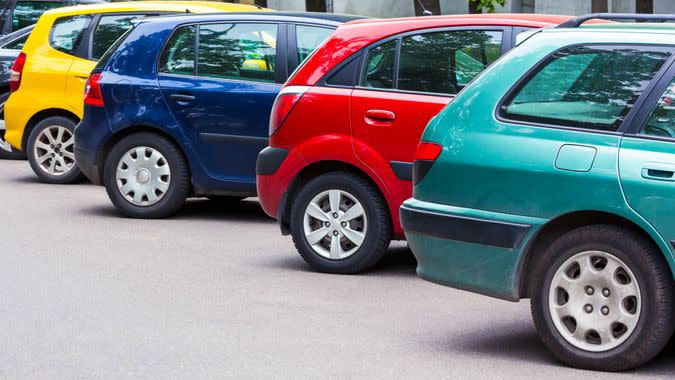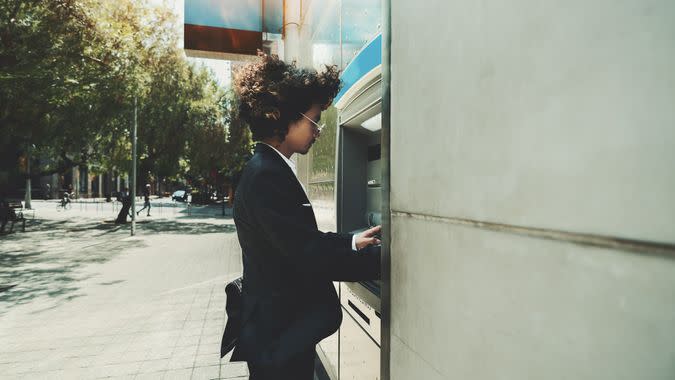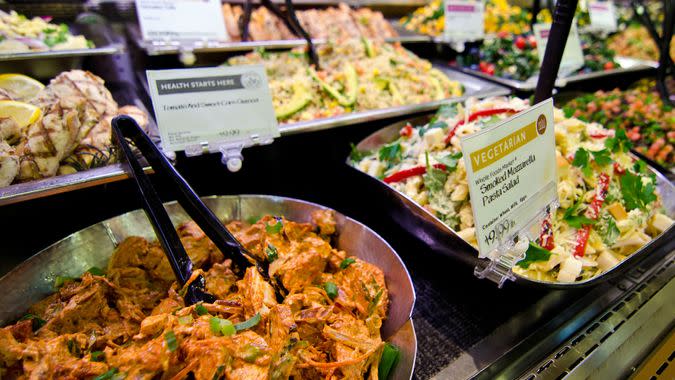10 Ways You Waste Money Every Day and Don’t Realize It

If you’re like many people, you’re burning through cash like crazy. In fact, the average American spends $1,497 per month on nonessential items — nearly $18,000 per year — according to a 2019 study commissioned by Ladder and conducted by OnePoll.
Overspending is never advisable, but this can be especially problematic if your money habits are either getting you into debt or making it hard for you to get out of debt. You might feel discouraged when looking at your month-end bank balance, but a few simple changes can make a world of difference.
2021 Small Business Spotlight: It’s Not Too Late to Nominate Your Favorite Small Business to Be Featured on GOBankingRates — Extended to June 5
A quick glance at your monthly expenditures might not offer obvious clues as to where you’re overspending, but there’s likely plenty. When you’re able to identify these areas, you can make changes that probably won’t impact your life too much — but will allow you to cut costs exponentially.
Ready to spend less money each month? Here’s a look at 10 ways you’re unknowingly wasting money.
Last updated: June 3, 2021

Parking
If you drive to your destination, you have to find a parking spot, but it’s not always free — especially in cities. Gary Grewal, financial planner and author of “Financial Fives,” said savvy planning or a willingness to do a little extra walking can equate to big savings.
“Use tools like Parkopedia or drive a few blocks outside the venue for street parking or ask for validation,” he said. “Most cities offer free (or) extended meter and street parking on Sundays and holidays — or take transit if you can.”
The Economy and Your Money: All You Need To Know

Confused Shopping
Walking into the supermarket without a list of what you need means you’ll likely buy a lot of items you can do without. Grewal said this approach to grocery shopping can get expensive fast, so he suggested getting organized before making a trip to the store.
“Many of us go to the store and forget if we have any baking powder or laundry detergent,” he said. “Take a quick inventory of your home before you head out.”
Read: How To Go Back To Work And Still Keep Unemployment Benefits

Not Reviewing Transactions
You like to believe simply swiping your card for a purchase or return will get the right amount of money in or out of your account, but it’s not always that easy. Grewal recommended reviewing your bank or credit card statements monthly, so you can catch any inaccuracies.
“I personally have seen a merchant double charge my card, or charge the wrong amount or not return the item correctly,” he said.
This step will only take a few extra minutes, but if you find a mistake, it can amount to major savings.
Find Out: 20 Ways To Pay Less at Costco

Procrastinating
If you tend to leave items on your to-do list until the last minute, Grewal said this habit can force you to spend extra cash.
“Whether it's booking plane tickets or ordering something you need by a certain date, doing things ahead of time or scheduling a time each week to knock out your to-do’s for the next month will save you money,” he said.
Not only will this allow you to take advantage of lower early bird rates — you’ll also enjoy feeling more relaxed, because you won’t be rushing to complete tasks at the eleventh hour.
Discover: 11 Ways Warren Buffett Lives Frugally

ATM Fees
It’s always frustrating to be charged a fee to access your own money, but this typically happens when you use an out-of-network ATM. Jim Pendergast, VP of altLINE Sobanco, a company partnered with The Southern Bank Company, recommended only getting cash from your bank so you’re able to avoid transaction fees.
“It's not uncommon for ATMs to charge $3 every time you take money out of your account,” he said. “If you take money out of an ATM three days per week, that adds up to around $500 per year.”
Of course, your bank might not always have an ATM nearby — or one in its ATM network — so Grewal advised always keeping $10-$20 in cash in your wallet, just in case.
Did You Know: Just How Rich Are Elon Musk, Donald Trump and These Other Big Names?

Unwanted Subscriptions
It’s easy to sign up for a service — i.e., online newspaper, app, music streaming platform — only to forget — or not realize — it’s an auto-renewal subscription. Pendergast said this is a common mistake, so make sure you’re not paying for a subscription you don’t even realize you still have.
“Many people are paying for subscriptions they're not using anymore,” he said. “Apps like Truebill will let you know which subscriptions are paid, to help you avoid paying for them in the future.”
Find Out: What Income Level Is Considered Middle Class in Your State?

Paying For Too Much Data
If you’re like most people, you spend a lot of time on your smartphone, so you need to be connected. However, Pendergast said you probably don’t actually need unlimited data.
“While having data is beneficial on the road and if you're in the middle of nowhere, most places have Wi-Fi,” he said.
For example, he noted that unlimited data plans for two smartphones with Verizon is $140 per month. However, if two lines share 5GB worth of data, that cost goes down to a total of $80 per month — resulting in $60 of monthly savings.
Read: The Average Retirement Age in Every State

Buying Pre-Prepped Food
When you’re in a hurry, tired or just don’t feel like cooking, buying pre-prepped food from the grocery store can seem like a reasonable alternative to takeout. However, Chrissy Randall, owner of Reimagining Wealth Inc., a company that offers wealth and money coaching services, said this habit can easily become an expensive one.
“We often go for the pre-grated cheese or the cut up fruit (or) vegetables, she said. “When we buy ingredients already prepped for us, we are spending two to four times as much as if we just took the extra couple of minutes to do it ourselves.”
Discover: Here’s What the US Minimum Wage Was the Year You Were Born

Buying Cheap Items That Need To Be Replaced Often
On the surface, buying the most inexpensive item on the shelf seems like a great way to save money, but Randall said it isn’t that cut and dry.
“If you buy the $17 toaster, but it breaks in six months, instead of the $60 toaster that lasts 10 years, you are throwing money in the trash, she said. “Do your research and buy quality over cheap.”
This strategy will likely cost you more upfront, but you’ll save big in the long-term by purchasing items made to last.
Read: 3 Alarming Ways Women Are Lagging Behind Men When It Comes to Their Finances

Missing Happy Hour
Going out with friends when the night is still — very — young might seem lame, but Randall said failing to take advantage of happy hour prices will seriously drive your tab up.
“Meeting your friends early and enjoying the discounted drinks and food can save you a big chunk of cash on your bill,” she said.
Happy hour is essentially a coupon for many items on a restaurant’s normal-priced menu, so take advantage of this opportunity to cash in.
More From GOBankingRates
This article originally appeared on GOBankingRates.com: 10 Ways You Waste Money Every Day and Don’t Realize It

